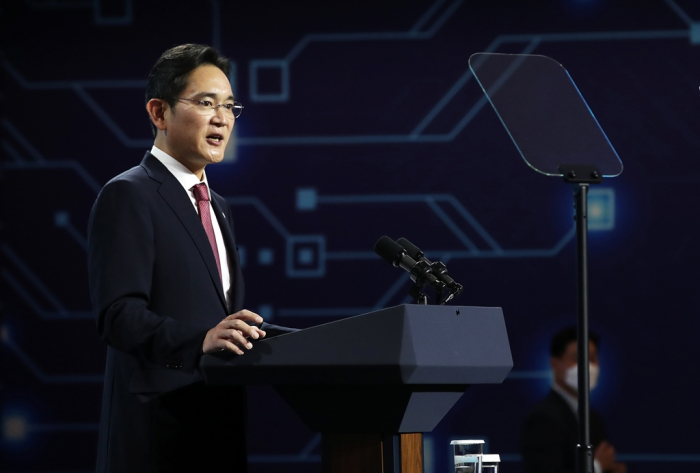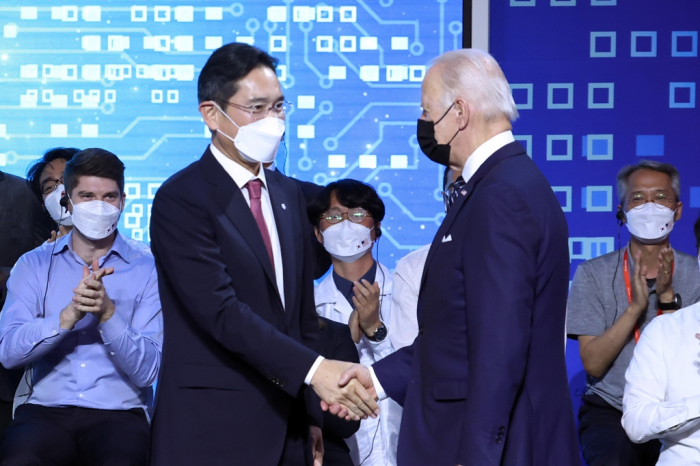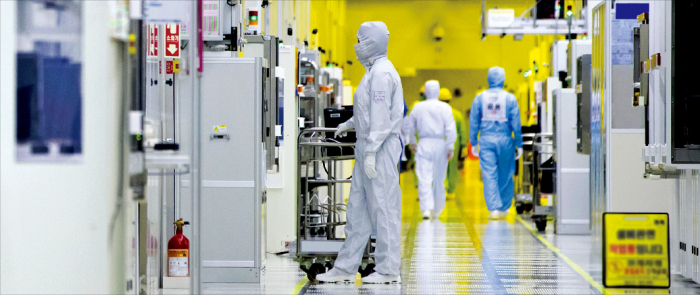Samsung leader Lee, Intel CEO Gelsinger discuss chip alliance
A closer partnership with Intel will help Samsung catch up to its bigger foundry rival TSMC, analysts say
By May 30, 2022 (Gmt+09:00)
LG Chem to sell water filter business to Glenwood PE for $692 million


KT&G eyes overseas M&A after rejecting activist fund's offer


Kyobo Life poised to buy Japan’s SBI Group-owned savings bank


StockX in merger talks with Naver’s online reseller Kream


Meritz backs half of ex-manager’s $210 mn hedge fund



Samsung Group’s de facto leader Jay Y. Lee on Monday met with visiting Intel Corp. Chief Executive Pat Gelsinger in Seoul to explore ways to further strengthen their business cooperation.
At the meeting held at Samsung Electronics Co.'s headquarters in southern Seoul, the two leaders of the world’s top chipmakers discussed possible collaboration in the design and manufacture of next-generation semiconductors and the foundry business, according to Samsung.
The meeting, held amid intensifying competition to stay ahead in next-generation chip technology, follows US President Joe Biden’s recent visit to Samsung’s main semiconductor factory in Korea.
On May 20, Lee, officially Samsung’s vice chairman, welcomed the US president to the company’s chip plant in Pyeongtaek to showcase its state-of-the-art chipmaking technology, which is widely expected to be employed at its multi-billion-dollar chip plant to be built in the US in the near future.

Monday’s meeting between Lee and Gelsinger was joined by Samsung Co-CEO Kyung Kye-hyun, who oversees the company’s chip business; Roh Tae-moon, head of Samsung’s mobile business; Lee Jung-bae, its memory business chief; and Choi Si-young, Samsung’s foundry business chief.
Following President Biden’s Seoul trip, Samsung announced last week that it would spend 450 trillion won ($355 billion) over the next five years in strategic sectors such as semiconductors, biotechnology and 6G telecommunications.
Much of the investment will go toward its semiconductor division, which is expanding rapidly to compete with foundry leader Taiwan Semiconductor Manufacturing Co.
LONG-TERM PARTNER AND RIVAL
Samsung, the world’s largest memory chip and smartphone maker, has for decades been a key partner and rival for Intel, which in recent years was striving to flex more muscle in the semiconductor industry, particularly in the foundry sector.
In terms of revenue, Samsung’s semiconductor business had been behind Intel until 2021, when the Korean tech giant posted 94.2 trillion won ($82.3 billion) sales in its chip division to overtake the US chip company, which reported $79 billion in revenue.
In the third quarter of last year, Samsung’s DRAM chip shipment worth $21 billion also overtook that of Intel for the first time in 11 quarters.

In March of 2021, Intel announced that it is reentering the contract chip manufacturing market to challenge TSMC and Samsung, which have dominated the foundry sector for years.
Intel is building two foundry production lines in Arizona with $20 billion in investment. Intel CEO Gelsinger said at the time the company will use those factories, set to start operations in 2024, to make its own chips but also open them to outside customers in its foundry business model.
FURTHER SAMSUNG-INTEL COOPERATION
In a recent interview with CNBC, the Intel chief stressed the importance of Asia in the global chip ecosystem and said that Intel wanted to build good relationships with chipmakers in Asia.
Industry watchers said the Intel CEO's Seoul trip may be intended to strengthen its business tie-up with Samsung across the board, including chip design, foundry and memory chip production.

In a number of electronic devices, Samsung’s memory chip modules and Intel’s processors are closely linked, thus compatibility and interoperability are key to the two companies’ next-generation products.
A closer partnership between the two companies would also help Samsung catch up to its bigger foundry rival TSMC, industry officials said.
Intel, while announcing billions of dollars of investment in the chip business last year, said it aims to produce a 1.8-nanometer chip by 2024 – a move industry watchers say could be far-fetched.
Four years ago, Intel said it was withdrawing from the chip foundry market after its technology failed to produce chips with 10 nm and below process node.
Samsung, the world’s No. 2 foundry player, said last October that it will be able to commercialize a 2 nm transistor process technology by 2025 to take on TSMC at the leading edge of chip processing for fabless firms, including chip designers.
“While Intel focuses on the production of CPUs, it will likely continue to outsource other chipsets to foundries such as TSMC and Samsung even after the US company has its own foundry plant,” said an industry official.
Write to Shin-Young Park and Ji-Eun Jeong at nyusos@hankyung.com
In-Soo Nam edited this article.
-
 BatteriesWhy batteries were left out of Samsung's huge investment plan
BatteriesWhy batteries were left out of Samsung's huge investment planMay 30, 2022 (Gmt+09:00)
4 Min read -
 Corporate investmentSamsung to invest $355 billion in chip, biotech, 6G over five years
Corporate investmentSamsung to invest $355 billion in chip, biotech, 6G over five yearsMay 24, 2022 (Gmt+09:00)
3 Min read -
 Behind the ScenesSamsung in do-or-die race with $355 bn spending plan
Behind the ScenesSamsung in do-or-die race with $355 bn spending planMay 26, 2022 (Gmt+09:00)
2 Min read -
 Korean chipmakersSamsung to make mobile AP chip dedicated to Galaxy smartphones
Korean chipmakersSamsung to make mobile AP chip dedicated to Galaxy smartphonesMay 16, 2022 (Gmt+09:00)
3 Min read -

-
 The KED ViewCan Samsung Electronics ever catch up to foundry leader TSMC?
The KED ViewCan Samsung Electronics ever catch up to foundry leader TSMC?May 03, 2022 (Gmt+09:00)
4 Min read -
 Korean chipmakersIntel’s curious revelation of its ASML deal raises questions
Korean chipmakersIntel’s curious revelation of its ASML deal raises questionsJan 21, 2022 (Gmt+09:00)
1 Min read -
 Korean chipmakersSamsung overtakes Intel as foundry looms as next battlefield
Korean chipmakersSamsung overtakes Intel as foundry looms as next battlefieldAug 02, 2021 (Gmt+09:00)
3 Min read -
 Korean chipmakersIntel’s jump into foundry sets off alarm bells for Samsung, TSMC
Korean chipmakersIntel’s jump into foundry sets off alarm bells for Samsung, TSMCMar 24, 2021 (Gmt+09:00)
3 Min read


